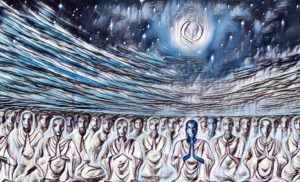2.5 (15) The Lay Follower (Upāsaka Sutta)
Thus has it been made known. At one time the Blessed One was residing near Sāvatthī, at the Jeta Grove in Anāthapiṇḍika’s Park. A certain lay-follower from Icchānaṅgala had been staying in Sāvatthī in order to settle-up some business affairs. Afterwards, he approached the Blessed One and having bowed respectfully to him, sat down on one side. After a while, the Blessed One addressed the lay follower thusly: “It’s been a long time, upāsaka, since you have been amongst us.”
“For a very long time, Blessed One, I have wanted to come and be with you; sadly, I’ve been so involved in my business affairs that there is very little time for me to do anything else.”
Upon realizing the significance of his response, the Blessed One uttered the following penetrating verse:
For one who owns nothing there is great bliss,
He alone has mastered the Dhamma indeed!
Behold! Those who cling to their possessions
Are forever bound to their earthly kin!
Icchānaṅgala: [alt. Icchānaṅkala]. Pāli name of a brāhmaṇa village in the Indian kingdom of KOŚALA, on the outskirts of which was a grove where the Buddha preached the Pāli Ambaṭṭhasutta to the brāhmaṇa youth, Ambaṭṭhamānava. The Pāli SUTTANIPĀTA states that the town was the residence of several eminent brāhmaṇas. Elsewhere it is said that brāhmaṇas were in the habit of visiting the grove to discuss their interpretations of the Vedas.
The Buddha preached the Icchānaṅgalasutta to a gathering of monks at the village, in which he described how he had spent his time while in solitary retreat practicing mindfulness on breathing (ĀNĀPĀNASMṚTI). He declares dedication to this practice to be a life lived according to the noble (ĀRYA) way and one that leads to the destruction of the contaminants (ĀSRAVA) and the attainment of ARHATship.
Buswell Jr., Robert E.; Donald S., Jr. Lopez. The Princeton Dictionary of Buddhism (Kindle Locations 28288-28294). Princeton University Press. Kindle Edition.
Upāsaka: in this case a “novice” layman.
This passage bears an uncanny resemblance to the one in scripture of the young rich man who wasn’t able to let go of his possessions in order to follow Jesus. Jesus responds by saying, “How hard it is for the wealthy to enter the kingdom of God.” (Mark 10:17-27) The same principle is applied to this Upāsaka. For the Buddha, the Dhamma is wasted upon such worldly ones and thus Nibbāna is very far at hand.
2:6 (16) The Pregnant Woman (Gabbhinin Sutta)
Thus has it been made known. At one time the Blessed One was residing near Sāvatthī, at the Jeta Grove in Anāthapiṇḍika’s Park. Around this time a young brāhmaṇa wife of a certain wanderer was pregnant with child. Near her delivery time she implored her husband, “Please, quick! Fetch me some oil for my baby is near at hand!”
Nervously, the wanderer replied to her: “But where am I supposed to find some oil?”
Then for a second and third time the wife demanded, “Be gone with you then and fetch me some oil!!!”
It was during that time that a certain storehouse of King Pasenadi Kosala housed oil for contemplatives and Brahmins but exclusively reserved for drinking at the location, and not removal of any oil. The wanderer thought to himself, “That storehouse of King Pasenadi Kosala has some oil, but only for consumption on the spot. What am I to do? Wait! What if I were to drink enough oil and then return home and vomit-it-up and then offer it to my wife in order to help her birth her child?”
Thereupon the wanderer went to the storehouse of King Pasenadi Kosala and drank a heavy amount of the oil. But upon returning home, he could neither vomit-it-up nor allow it to pass through him. Wracked with pain, he rolled-about on the ground in utter agony!
Now the Lord, having dressed in his robe and outer cloak while carrying his alms-bowl, was walking towards Sāvatthī during the forenoon when he encountered the wretched wanderer writhing and rolling-about in pain.
The Blessed One then uttered the following verse:
How blissful are those who own nothing,
Who serve only the Dhamma and no-thing else.
Behold one who is tortured to have possessions,
He is forever bound to his earthly-ties.
King of Kosala: a contemporary of the Buddha. He was the son of Mahā Kosala, and was educated at Takkasilā where, among his companions, were the Licchavi Mahāli and the Malla prince Bandhula. On his return home his father was so pleased with his proficiency in the various arts that he forthwith made him king. (DhA.i.338; for his genealogy see Beal: Records ii.2, n. 3).
As ruler, Pasenadi gave himself wholeheartedly to his administrative duties (*2) and valued the companionship of wise and good men (*3). Quite early in the Buddha’s ministry, (*4) Pasenadi became his follower and close friend, and his devotion to the Buddha lasted till his death.
According to Peter Masefield in his massive commentary, the oil referred to in this passage was sesame-oil which was “needed for the sake of counteracting labour pains in delivery.” It seems pretty obvious that this bizarre little tongue-in-cheek tale was meant as a parody for those who cling to their material wealth—so much so that they can’t get rid of it no matter how hard they attempt to do so (thus the absurdity of not being able to vomit or shit-it-out). Quite an amusing anecdote.

